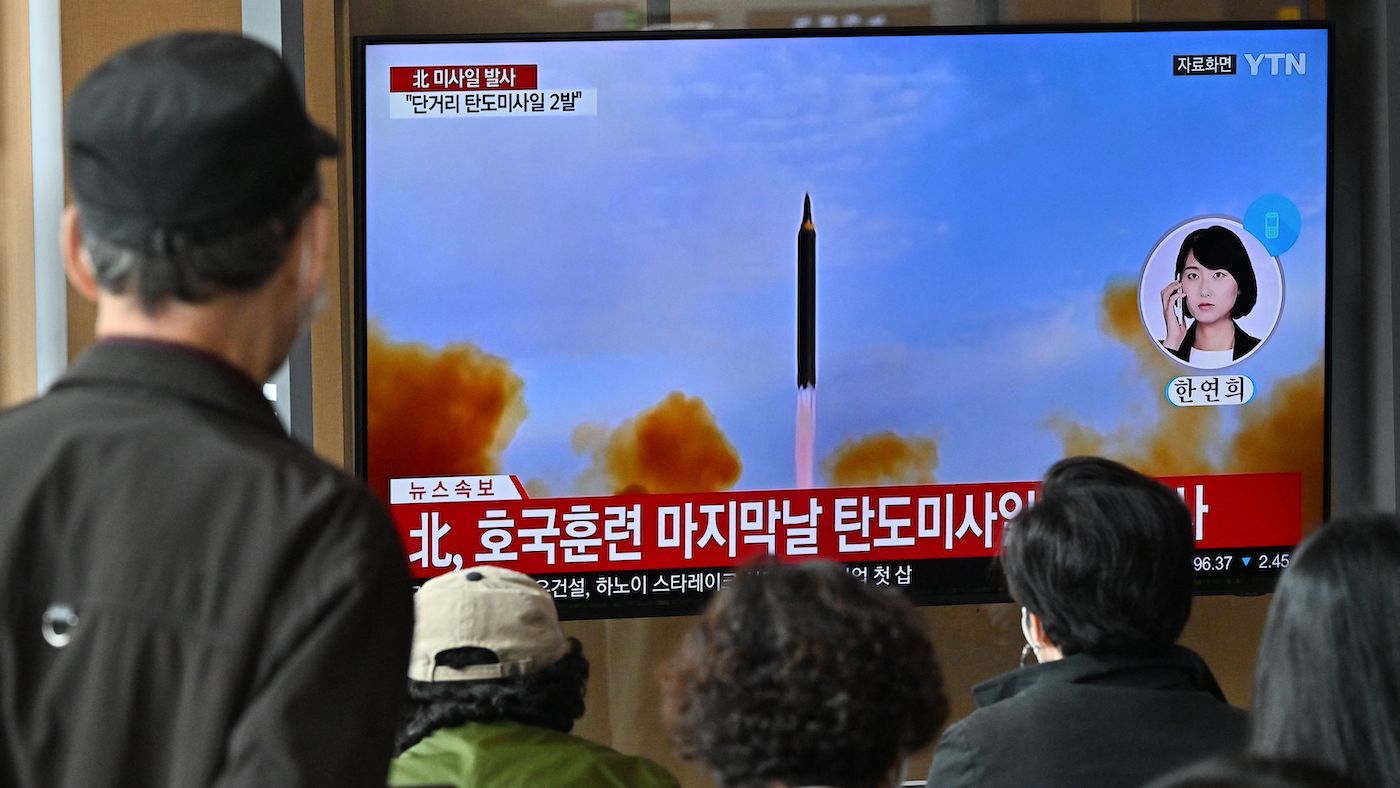Why is North Korea upping the pressure?
Pyongyang launched the latest of its missile tests on Wednesday, with one projectile landing close to the South Korean coast

A free daily email with the biggest news stories of the day – and the best features from TheWeek.com
You are now subscribed
Your newsletter sign-up was successful
South Korea has fired missiles into waters off North Korea in response to what it described as an “unprecedented and unacceptable” violation of its territory.
On Wednesday morning, the North fired more than ten missiles from its eastern and western coasts, with one projectile crossing the Northern Limit Line (NLL), the disputed maritime demarcation line between the two countries, and landing in the East Sea, just 35 miles off the coast of South Korea. The South said its three missiles landed a similar distance beyond the NLL.
It was the “first time a ballistic missile had landed near the South’s waters” since the division of the peninsula in 1945, said Reuters, as “tensions spiralled in the region”.
The Week
Escape your echo chamber. Get the facts behind the news, plus analysis from multiple perspectives.

Sign up for The Week's Free Newsletters
From our morning news briefing to a weekly Good News Newsletter, get the best of The Week delivered directly to your inbox.
From our morning news briefing to a weekly Good News Newsletter, get the best of The Week delivered directly to your inbox.
The animosity between the nations has “been running high in recent months”, said AP, with the North ramping up testing of nuclear-capable missiles this year. It could “up the ante in coming weeks” having completed preparations to detonate its first nuclear test device since 2017.
The North has maintained that its missile launches have been in response to regular military drills held between allied South Korea, the United States, and Japan in the region, which it described as “aggressive and provocative”.
The US State Department said recent drills were “purely defensive in nature”, adding that there was no military threat towards the north. Upping the pressure in the region by the North through nuclear tests would be a “dangerous, destabilising step”, it said.
What did the papers say?
The prospect of new nuclear tests by North Korea “underscores the limited options” available to the US and the South in preventing it from developing further nuclear weapons, said Reuters. “Sanctions, diplomatic pressure and shows of military force” have had limited effect, and the US and South Korea are now “looking to simply dissuade the North from military action” rather than stopping it from becoming a nuclear power.
A free daily email with the biggest news stories of the day – and the best features from TheWeek.com
In September, North Korea enshrined in law the ability to carry out preemptive nuclear strikes to protect itself, with its leader Kim Jong Un saying there would be no negotiations on denuclearisation. “Kim may be no stranger to colourful language, but it is worth taking his vow seriously,” wrote Paula Hancocks at CNN, who said it was time to “call a spade a spade and accept that North Korea is in fact a nuclear state”.
The US is, however, reluctant to do so for fear of “sparking a nuclear arms race in Asia” and it shows “no signs of abandoning” its tactic of convincing the North to give up its nuclear arms.
Pyongyang’s “strategic goal” in becoming a recognised nuclear state was to pressure the US into removing “the sanctions that are hampering its trade”, said Nam Hyun-woo in The Korea Times. However, it is “becoming more difficult to predict the ultimate purpose of the North’s recent provocations” and the enmity between the North and the South is only growing as both nations take “hardline approaches”.
Accepting the North as a nuclear state and lifting sanctions would not lead it to “change its core philosophy”, argued former US special envoy for North Korea Stephen Biegun, at Politico. He said it would “weaken the global non-proliferation regime” and “create new incentives for other countries to have nuclear weapons”.
What next?
The ongoing “round of war games” by the US and the South in the region “may well provide Kim Jong Un with the pretext he has been waiting for”, wrote Jean Mackenzie at the BBC. The North “has blamed its enemies for escalating tensions” and is “preparing the ground for a more provocative test”, with the expectation that he is waiting for the “opportune political moment” to test a nuclear device.
The major problem for the allied nations in easing tensions is that “all the options on the table rely on some form of engagement with North Korea”, said Hancocks at CNN, “something entirely lacking at present”. She said that the “reticence” for talks with the US is “not all down to Pyongyang” and that “no offers of talks from the Biden administration or others have yet turned [Kim Jong Un’s] head in the slightest”.
Moving to “turn the volume down” on military drills in the region could help reduce tensions, a senior former US defence official told Reuters. “Stepped-up drills ensure readiness,” but the “publicity and chest-beating surrounding them can be counterproductive”.
Richard Windsor is a freelance writer for The Week Digital. He began his journalism career writing about politics and sport while studying at the University of Southampton. He then worked across various football publications before specialising in cycling for almost nine years, covering major races including the Tour de France and interviewing some of the sport’s top riders. He led Cycling Weekly’s digital platforms as editor for seven of those years, helping to transform the publication into the UK’s largest cycling website. He now works as a freelance writer, editor and consultant.